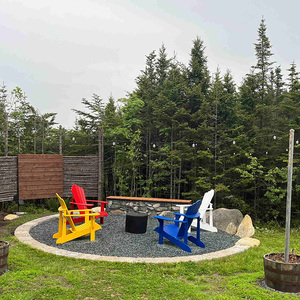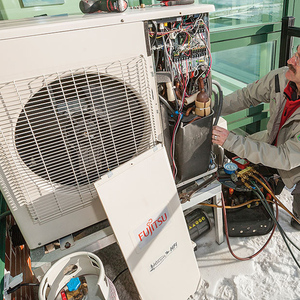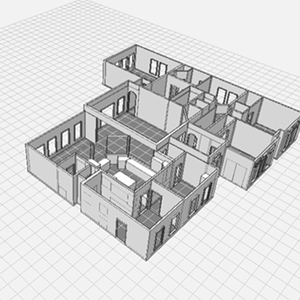I am building a 1 1/2 story, home for my family. While planning for the home we included a home sprinkler in the cost. While it is expensive if it saves my family it is worth the cost. My builder has never been a big fan of the idea. He is worried about leaks, about someone putting a nail through the pipe, etc.
What is the general opinion of the board about these systems? Are there any good contractors who are installing these (in the SE)?
Thanks,



















Replies
It is my opine that if I were to build new I'd try to include a fire sprinkler system.
I've seen commercial systems that have saved buildings and lives. Might save on insurance too.
I think that your builder's worry is over blown.
Smoke alarms save lives to, not saying not to go sprinkler route, but alarms might be enough. Might want to discuss it with your insurance agent, I have heard insurance companies hate them. They might do more damage in the short run that a well placed dry extingusher could handle instead, because of water damage. Have heard those with them pay a heavy cost on premiums. An alarm service with tied in fire sensors may be enough you get a discount for that.
Also I do not know of anyone personaly that has died in a house fire, it does happen but when was the last time a house caught fire on your block? They are rare in areas some places are more prone.
Wallyo
Edited 1/18/2008 3:34 pm ET by wallyo
Most insurance companies do give a discount for a security system that has smoke alarms, in fact just the other day I sent in the forms to my insurance guy to renew my discount.
Also I do not know of anyone personaly that has died in a house fire, it does happen but when was the last time a house caught fire on your block? They are rare in areas some places are more prone.
It happens....my sister and her husband were killed in a house fire last summer. A sprinkler would have almost certainly saved their lives, but unfortunately they didn't even have a working smoke alarm.
I am very sorry to learn that and feel remorse for my words. I was just trying to make a point that fire deaths are not as common as deaths in autos according to the US fire administration http://www.usfa.dhs.gov/statistics/national/index.shtm
there were 3245 deaths in 2006 last year auto death were 45000+. But it does not help when you are a part of the stictics. Just that there are other means of detection like detectors and alarms with a alarm service. Just that Emraiden needs to do what he is doing and inquire, I have been thinking about having them in our new house untill I started talking to people and hearing about accidental start ups and water damage they can cause. But we are far from that decision and I don't know what I am going to do, actual I am on the fence. Plus a contractor should do what ever you what him to.Again sorry for your loss.Wallyo
Edited 1/18/2008 9:53 pm ET by wallyo
Have you researched how they are installed and serviced? The reason I ask is because they are required in some high fire risk areas now. In the hills above L.A. they are requiring them now.
The heads have to be installed properly in the right places or it won't work or the covers won't be flush with the finished ceiling.
You can't just install one and forget about it. I don't know about residential but in commercial they need to be inspected once a year.
In L.A. There was a big red box installed on the front of the house with a bell/siren/flashing light in it that the fire dept had a key to and has to re-set.
I'm not sure but I think in L.A. they are linked to the fire dept by phone line so if the alarm is tripped they are coming automatically.
In some places you will be charged for the trip if it is a false alarm.
I'd think about some of this stuff before you commit to the idea.
Depending on distance from the road and hydrants and the size of dwelling they are required in some rural areas near me.
IIRC you get quite a break on fire insurance .
On page 29 of the new issue of FHB there is an ad for home sprinklers.
Homefiresprinkler.org or1-888-635-7222
For what it is worth, I have always been told that smoke detectors hard wired with batteries in (not disabled) save lives.
Sprinklers are intended to save property which makes sense for commercial space.
I dont think I would invest in it in my new home, but I have 10 working Smoke detectors in my home and 2 CO detectors.
I know in Philly, round this time of year, there are a few deaths from fire and pretty much every time they tell us in the news that there were disabled SD's in the home.
BTW I was told this by several fire marshals both in jersey and PA.
I would talk to some fire officials and get their thoughts as they see the ugly side of it and likely have good opinions.
Sprinklers, even household ones, are a job for a specialty contractor. If the general can't wok with the sprinkler contractor ... it's time to find a REAL general.
The effect a single sprinkler can have on a fire in a room is simply amazing. It's not a matter of sprinklers competing with alarms; the two compliment each other.
Sprinkler codes have been relaxed / simplified for homes. Your system need not be as fancy as the one you see in a hotel or warehouse.
There is actually a movement to make sprinklers mandatory for new homes. I would not want to make them mandatory ... but they're a fine thing to have!
Indeed, if I were living in a trailer, I'd be damn sure to retro-fit in some sprinklers. The 'poor peoples' ' housing seems to have the greatest need for such protection - yet you're more likely to find it in Bill Gates' neighborhood than mine.
My hands-on experience with sprinkler systems is some 30+ years old, so I may be somewhat out of date. Years ago I worked as a fire protection engineer for a major insurer of the largest industrial facilities. Out company basically would not insure a property unless it had a sprinkler system. The economics of industrial loss where significantly higher when a fire occurred in a non-sprinklered building.
I have not had much experience with domestic fire sprinkler systems. However, I would expect to losses to be much higher in those properties without sprinkler systems than those with working sprinklers. In my experience, in my three years with the company, I can only think of one time that a sprinkler head discharged without there being a fire. That was because the head was hit by a fork lift - not too likely to occur in a home. One major difference might be that industrial properties in areas subject to freezing use a dry sprinkler system in which the pipes in the areas that might freeze are full of pressurized air. When a sprinkler head breaks and releases the air pressure, the pipes are then flooded with water. Home systems do not normally have this feature and thus a frozen pipe could cause some water damage.
AS someone has mentioned, requirements for home sprinkler systems have been relaxed over the years. They certain are allowed to use systems that were not allowed, or even existed, in my day; such as PEX and CPVC.
There is a government sponsored paper on the economics of residential fire sprinkler systems at:
http://www.fire.gov/newsletter/fall2006/EconAnalResidSprink.pdf
In the discussion in this paper, they cite the figures in one geographic area with losses from fires in fire sprinklered houses of $2,166 vs losses of $45,019 in unsprinklered ones.
I am planning on building a house in the near future. Even though I will be using fire resistant construction (a type concrete construction, including floors and roof), I am planning on putting in a sprinkler system in the basement wood shop and the garage and will probably also put fire sprinklers throughout the house. At this point, I am thinking of PEX tubing to provide some additional safeguard against freezing of the pipes.
Casey Do you know if plex can be used on houses? In my location the houses I have been in with sprinklers had systems with an orange pvc pipe labled "fire sprinkler" I suppose so no one cut into it or used it as another H2O source.Wallyo
I would assume that there might be some differences in local ordinances, but at least some areas do allow PEX for fire sprinklers. Uponor, which makes PEX plumbing systems, has a section on its web site regarding their PEX based fire sprinkler systems:http://www.uponor.us/Header/Systems/Fire/Overview.aspx
I do large residential projects---- the 20 to 50 story kind.
All of them by law have a sprinkler system.
Lawn sprinklers save your grass, fire sprinklers save your azz.
Property insurance generally increases, but not in every case.
Sprinklers will usually do more damage to property than a containable fire.
US Coast Guard power plants & DOE computer rooms have halon systems that protect equipment, but suck out all the oxygen so saving lives is not the purpose.
Uponor¯ AKA Wirsbo has a "flow through" system that makes the sprinklers part of the plumbing.
Most systems are independent of the plumbing though, & usually ran in orange cpvc pipe for residential applications.
Same rules apply as the plumbing when passing through the studs, must have nail plates.
& they don't leak any more than standard plumbing systems.
Is it true that usually property insurance increases when fire sprinklers exist? I've been wanting to add them to my house at some point, but haven't checked into the insurance yet.It seems to me that the water damage from one of them going off in a real fire will put out a lot less water than the fire dept will by the time they end up at the fire. I think that in a house fire, it's size doubles every three minutes or so. It only takes a few minutes before a single room and contents fire turns into a whole house fire.I saw a video once that I think that NFPA did of a desk type trash can fire in a furnished room. One room was sprinkled, and the other not. The sprinkled one was out in a couple minutes, before it burned anything other than the trash can. The unsprinkled one spread to the entire room in something like 10 minutes. The water used by the sprinkler was something like 18 gallons. The water used by the fire department was thousands of gallons. My memory of the actual numbers may be off a bit, but the differences really were that significant.I've heard that the sprinkler heads have an amazing track record for not activating falsely, but maybe I'm wrong.
Some companies did raise rates, but others have dropped. Once the word got out most companies stopped raising rates---- public opinion had a big part in that, & compitition with companies that were dropping rates played a big part.
With the advances in technology of the system, property damage due to misfires has fallen.
like all insurance it pays to shop around.
they started pushing this here just last week, I think its overkill when they can't even enforce smoke detectors, but how would a system work up here in the great white north, say in a bungalow, our attics are unheated, are all the pipes exposed on the ceiling, are they filled with antifreeze, or empty until used???
Lest we wander too far from the OP .... Household sprinklers have been something of an issue since the early 70's, when the industry was challenged by a Mr. Patten, who accused them of only wanting to save money, rather than lives. Widely vilified at the time, every one of his view have since been adopted. There was a sprinkler code written specifically for residences, and the system greatly simplified. In commercial applications, the presence of a sprinkler system saves money in three ways: fire insurance costs less, construction need not be as hefty, and there is often a tax write-off as well.
I see no reason that a residential system would not also result in an insurance saving. However .... a few things need to be said to clear up a few misconceptions:
First, sprinklers are not intended to put a fire out. They are intended to keep the fire small. That's one more reason to have the sprinklers tied into an alarm system. There are different types of sprinkler heads; some mount on the ceiling, while others can be wall mounted. So, you can run pipes in the crawl space, and come up the walls. Even exposed pipes are much less noticeable when run neatly in corners. Your usual sprinkler system needs to be kept in a freeze-free space. Sure, there are solutions for frozen areas, but those solutions are a bit beyond the scope of a household system. Antifreeze solutions have been used in some such systems. Whatever plumbing materials are used for the system, they need to be specifically listed for use with sprinkler systems. You aren't supposed to just run to HD for a nipple. Ditto for pipe supports. Plus, sprinkler companies want to "engineer" the thing for you, so they don't exactly just sell heads.
(I'm not saying that's necessarily a bad thing ... just something to keep in mind). Are household sprinklers "overkill?" Perhaps. That's a large part of the reason why I oppose making them mandatory. Let the market, the owner decide, I say. Unfortunately, it seems to be the nature of the "fire protection" to rely upon code "requirements" in preference to actually selling their product, or being competitive. This has resulted in a mind-set among designers of "if it's not legally required, it won't be used." IMO, even an incomplete, or poorly designed, sprinkler system is an improvement over no sprinklers at all.
The reason for rate increases is the chance on accidental start up kids throwing a ball indoors etc. not an actual fire.Wallyo
Since there are available concealed fire sprinkler heads, I think it would take a pretty strong arm to activate one of those:
<!---->
View Image
<!---->
Besides, how often have you seen kids wipe out a ceiling light in a house?<!----><!---->
From Science Daily News: http://www.sciencedaily.com/releases/2007/10/071011154124.htm Home Fire Sprinklers Score 'A' In Cost-benefit StudyScienceDaily (Oct. 15, 2007) — Sometimes life-saving technologies seem beyond the reach of the average person. If you put residential fire sprinklers in that category, think again. National Institute of Standards and Technology (NIST) economists ran the numbers. Their benefit-cost analysis found that for new home construction, a multipurpose network sprinkler system that connects to a house's regular water supply and piping makes good economic sense.NIST's Benefit-Cost Analysis of Residential Fire Sprinkler Systems report, released last month, examines data from 2002 to 2005 to value the economic performance of a residential "wet-pipe" fire sprinkler system. The additional economic benefits from installation of a multipurpose network sprinkler system (the least costly wet-pipe system available) are estimated for three types of newly constructed single-family houses that are also equipped with smoke detectors. The study builds on a prior cost analysis developed by NIST¡¯s Building and Fire Research Laboratory and offers a current analysis of the economics of residential fire sprinkler technology.According to NIST, the cost in 2005 dollars for adding a multipurpose network sprinkler system to a house under construction was approximately $2,075 for a 3,338-square-foot colonial-style house, $1,895 for a 2,257-square-foot townhouse and $829 for a 1,171-square-foot ranch house. However when a house fire occurs, the estimated benefits of a residential fire sprinkler system include a 100 percent reduction in civilian fatalities and a 57 percent reduction in civilian injuries, a 32 percent reduction of both direct property damage (property losses that would not be covered by insurance) and indirect property costs (fire-related expenses such as temporary shelter, missed work, extra food costs, legal expenses, transportation, emotional counseling and childcare). Houses with sprinklers, in addition to smoke alarms, also received an 8 percent reduction in homeowner insurance premiums, over houses only equipped with smoke alarms.After subtracting installation costs and weighting the benefits by the odds that a house would catch on fire, NIST economists concluded that, depending on assumptions, the net gain from installing a sprinkler system (in 2005 dollars) would vary between $704 and $4,801 for the colonial-style house, between $884 and $4,981 for the townhouse, and between $1,950 and $6,048 for the ranch-style house, over the 30-year study period. In all cases examined, the researchers found that the data supported the finding that multipurpose network residential fire sprinkler systems are cost-effective.The United States Fire Administration (USFA), part of the Department of Homeland Security (DHS), funded the research.Benefit-Cost Analysis of Residential Fire Sprinkler Systems (NISTIR 7451) by David T. Butry, M. Hayden Brown and Sieglinde K. Fuller.
Install for 2075 in what country? Timkline posted 16000 for a house in Pa a more complex job but still. Wallyo
Those look pretty cool. My kids or yours?
No your right, but when I have talked to local people about it that is the reason I have been given for higher rates not that situation in particular just accedinetail start ups.Though mine did bend an arm of a ceiling fan once when they threw something, much larger target.Wallyo
http://www.iredellhomebuilders.com/breakingnews.htm
Our local HBA made a big ta-do about keeping this topic optional.
This link probably contains more cons than pros.
The best reward for a job well done is the opportunity to do another.
Here are some additional resources for you to look at:
http://www.usfa.dhs.gov/citizens/all_citizens/home_fire_prev/sprinklers/
Also consider that about 25% of all house fire start in the kitchen you could always consider something like a hood fire suppression system:
http://www.usfa.dhs.gov/fireservice/research/dsn/nist11.shtm
" If guns kill people, a spoon made Rosie O'Donnel fat!"
Good point. Another is that with the new laws concerning self extinguishing cigarettes home fires should drop dramatically in the next few years. I would still install a sprinkler system if I lived any distance at all form a fire station (ie: a rural area)
They can't get your Goat if you don't tell them where it is hidden.
if you feel it's important to you, then do it !
i would do it in my own home.
i just priced a residential system for a home in PA that was about 2500 sf but did not have city water (well). the system was about $16K and required water storage tanks and a pump in the basement. this added to the cost compared to a home on city water.
use concealed heads to protect against random hits by the kids throwing footballs in the bedrooms.
carpenter in transition
my opion is to buy all the alarms you can afford. let the house burn. it's not easy reduing a partially built house
I did my own as follows:
After insulation and inspection (before) sheet rock; I ran all the lines and capped off where the sprinkler head goes. Installed sprinkler heads after final inspection.